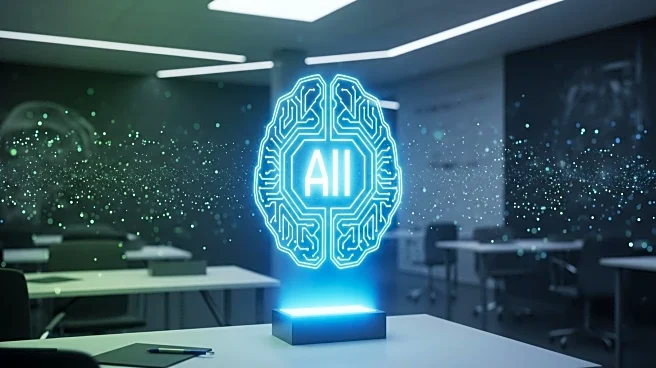What's Happening?
Higher education institutions are increasingly integrating AI into their operations to enhance student success, mental health support, faculty development, and campus security. Productivity suites like Google Workspace and Microsoft 365 offer generative AI tools to personalize learning experiences. AI is used to identify at-risk students and tailor mental health interventions. Faculty development programs incorporate AI to improve teaching methods and course design. AI also plays a role in cybersecurity, helping universities detect threats and streamline operations. Chatbots are used for various campus services, including scholarship opportunities and tutoring. AI-enabled cameras and access control systems enhance physical security on campuses.
Why It's Important?
The adoption of AI in higher education is crucial for improving student outcomes and operational efficiency. AI tools support personalized learning, helping students overcome academic challenges and enhancing their educational experience. By addressing mental health needs, AI contributes to student well-being and retention. Faculty development programs that incorporate AI prepare educators to leverage technology effectively, improving teaching quality. AI's role in cybersecurity ensures campus safety, protecting sensitive data and infrastructure. As universities embrace AI, they set a precedent for technological integration in education, influencing future policies and practices.
What's Next?
Universities are likely to continue expanding their use of AI, exploring new applications for student support and campus operations. As AI tools become more advanced, institutions may develop comprehensive strategies to integrate technology across all aspects of education. Collaboration with tech companies could lead to innovative solutions for academic and administrative challenges. The focus on AI in higher education may drive research into its impact on learning and security, shaping future educational models. Stakeholders, including educators, students, and policymakers, will need to address ethical considerations and ensure responsible AI use.
Beyond the Headlines
The integration of AI in higher education raises ethical questions about data privacy, student autonomy, and the potential for bias in AI systems. Institutions must navigate these challenges to ensure AI is used responsibly and equitably. The cultural shift towards AI-enhanced education may redefine traditional teaching methods and student interactions, influencing the future of learning. As AI becomes more embedded in educational settings, universities must balance technological innovation with ethical considerations, fostering a safe and inclusive environment for all students.










